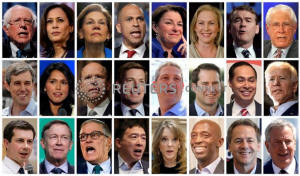|
Democrats grapple with 'electability'
question as white men lead diverse field
 Send a link to a friend
Send a link to a friend
 [May 24, 2019]
By Sharon Bernstein [May 24, 2019]
By Sharon Bernstein
SACRAMENTO, Calif. (Reuters) - Democrats
seeking to unseat Republican U.S. President Donald Trump in 2020 will
choose from the largest and most diverse set of candidates in history -
yet, so far, two older white men are leading the pack.
The early dominance of former Vice President Joe Biden, 76, and U.S.
Senator Bernie Sanders, 77, is raising uncomfortable questions about
whether Democratic voters think a woman or minority candidate has what
it takes to defeat Trump, the likely Republican nominee.
Women candidates played a key role in Democrats regaining control of the
U.S. House of Representatives last year. But they still face greater
hurdles than men in seeking executive offices, and there is division in
the party about what kind of candidate is best suited to win in November
2020.
“How do you beat Big Daddy Trump? One of the ideas is that you beat him
with Big Daddy Joe,” Christine Pelosi, daughter of House Speaker Nancy
Pelosi and chairwoman of the California Democratic Party's women's
caucus, said in reference to Biden.
Pelosi, who has not endorsed a candidate, did not say if she agrees with
that assessment. She thinks a woman ultimately will end up on the
Democratic ticket.
Ten of the 24 Democrats seeking the nomination are minorities or women.
They are all polling behind Biden and Sanders, who are getting the most
support among Democrats in all demographic groups, including minorities,
Reuters/Ipsos opinion surveys show.

Democratic strategist Rose Kapolczynski, who ran campaigns for former
U.S. Senator Barbara Boxer, said that is not just because they are white
men. "It's because they're well known and liked among Democratic
voters," she said.
She also said public debates this summer will give other candidates a
chance to better introduce themselves to a national audience.
Biden has raced out to a strong early lead, helped by his name
recognition and a sense among many voters that he may have the best
chance of beating Trump in battleground states.
Stefanie Brown James, a strategist and cofounder of the Collective PAC,
which backs and trains progressive African American candidates, said
Biden is respected by African-Americans for his role in the
administration of Barack Obama, the nation's first black president.
"For the black community especially, this is a man who was an elder
statesman who made the decision to be the number two to the first black
man running for the office," she said. "Speaking of privilege and ego,
not a lot of people would do that."
In Memphis, a predominantly Democratic and majority black city, Senator
Elizabeth Warren, who is white, and Senator Kamala Harris, who is of
African-American and Indian descent, have devoted followings among
Democrats of color, said Corey Strong, a former local party chairman.
Senator Cory Booker, an African-American man, is also popular, he said.
But most people he has talked to still cite Sanders or Biden as their
eventual pick, he said, in part out of concern that the other contenders
will not be able to defeat Trump.
"A lot of people (are) saying, 'I like this person' but also saying 'I
want a guy that can win as well,'" Strong said.
[to top of second column]
|

wenty four 2020 Democratic presidential candidates are seen in a
combination from file photos (L-R top row): U.S. Senators Bernie
Sanders, Kamala Harris, Elizabeth Warren, Cory Booker, Amy Klobuchar,
Kirsten Gillibrand, Michael Bennet and former U.S. Senator Mike
Gravel. (L-R middle row): Former Texas congressman Beto O'Rourke,
U.S. Representatives Tulsi Gabbard, John Delaney, Eric Swalwell, Tim
Ryan, Seth Moulton, former HUD Secretary Julian Castro and former
U.S. Vice President Joe Biden. (L-R bottom row): Mayor Pete
Buttigieg, Former Gov. John Hickenlooper, Gov. Jay Inslee, Andrew
Yang, Marianne Williamson, Mayor Wayne Messam, Montana Gov. Steve
Bullock and New York City Mayor Bill de Blasio. REUTERS/Files/File
Photo

MORE BARRIERS
Women and minority candidates fighting for attention in a crowded
field also must overcome ingrained prejudices that affect voter
choices.
Women are less likely than men to be chosen for executive offices
such as president, according to research by the Barbara Lee Family
Foundation, which studies elections.
While people will vote for a man they do not like, they generally
will not vote for women they dislike, the research shows. And women
must show they are strong enough to keep the country safe.
"If she's going to be the decision-maker, voters have to be that
much more convinced that she's qualified," said foundation
spokeswoman Amanda Hunter. "There are even more barriers when they
run for executive office if they happen to be women of color."
The result is an unfair playing field, tilted against women and
minority candidates as they vie for media coverage, donations and
votes, said Toni Van Pelt, president of the National Organization
for Women.
"We are concerned about the never-ending narrative about
'electability' that seems to indicate that a candidate must be white
and male to win," Van Pelt said. "This notion has been knocked down
repeatedly with the election of Barack Obama and, despite Russian
interference and pervasive sexism, Hillary Clinton winning the
popular vote in 2016."
Harris has taken on the electability question on the campaign trail.
At a speech in Detroit, she said the debate is often too simplistic
by suggesting "certain voters will only vote for certain candidates"
and overlooks the voices of black and female voters in places such
as the Midwest.
Many party activists and voters say the Democratic nominee should be
anyone who has the charisma, fortitude and support to defeat Trump -
regardless of gender or race.
Voter Aleia White, 32, agrees. She would prefer, however, that the
eventual nominees for president and vice president reflect America's
diversity.

“It’s important that the ticket represent our country," White said
at a recent campaign event for Warren in Ohio. "We’re not all white
men.”
(Reporting by Sharon Bernstein; Additional reporting by Amanda
Becker in Cincinnati; Editing by Colleen Jenkins and Cynthia
Osterman)
[© 2019 Thomson Reuters. All rights
reserved.]
Copyright 2019 Reuters. All rights reserved. This material may not be published,
broadcast, rewritten or redistributed.
Thompson Reuters is solely responsible for this content. |